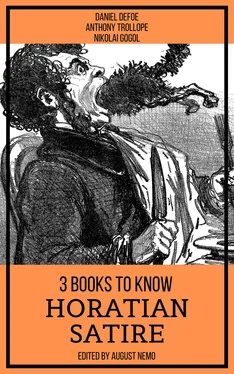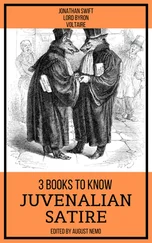About four in the morning the house was roused by the coming of the baronet. Failing to leave town by either of the afternoon trains, he had contrived to catch the evening mail, and had found himself deposited at some distant town from which he had posted to Carbury. Roger came down in his dressing-gown to admit him, and Lady Carbury also left her room. Sir Felix evidently thought that he had been a very fine fellow in going through so much trouble. Roger held a very different opinion, and spoke little or nothing. ‘Oh, Felix,’ said the mother, ‘you have so terrified us!’
‘I can tell you I was terrified myself when I found that I had to come fifteen miles across the country with a pair of old jades who could hardly get up a trot.’
‘But why didn’t you come by the train you named?’
‘I couldn’t get out of the city,’ said the baronet with a ready lie.
‘I suppose you were at the Board?’ To this Felix made no direct answer. Roger knew that there had been no Board. Mr Melmotte was in the country and there could be no Board, nor could Sir Felix have had business in the city. It was sheer impudence — sheer indifference, and, into the bargain, a downright lie. The young man, who was of himself so unwelcome, who had come there on a project which he, Roger, utterly disapproved — who had now knocked him and his household up at four o’clock in the morning — had uttered no word of apology. ‘Miserable cub!’ Roger muttered between his teeth. Then he spoke aloud, ‘You had better not keep your mother standing here. I will show you your room.’
‘All right, old fellow,’ said Sir Felix. ‘I’m awfully sorry to disturb you all in this way. I think I’ll just take a drop of brandy and soda before I go to bed, though.’ This was another blow to Roger.
‘I doubt whether we have soda-water in the house, and if we have, I don’t know where to get it. I can give you some brandy if you will come with me.’ He pronounced the word ‘brandy’ in a tone which implied that it was a wicked, dissipated beverage. It was a wretched work to Roger. He was forced to go upstairs and fetch a key in order that he might wait upon this cub — this cur! He did it, however, and the cub drank his brandy-and-water, not in the least disturbed by his host’s ill-humour. As he went to bed he suggested the probability of his not showing himself till lunch on the following day, and expressed a wish that he might have breakfast sent to him in bed. ‘He is born to be hung,’ said Roger to himself as he went to his room — ‘and he’ll deserve it.’
On the following morning, being Sunday, they all went to church — except Felix. Lady Carbury always went to church when she was in the country, never when she was at home in London. It was one of those moral habits, like early dinners and long walks, which suited country life. And she fancied that were she not to do so, the bishop would be sure to know it and would be displeased. She liked the bishop. She liked bishops generally; and was aware that it was a woman’s duty to sacrifice herself for society. As to the purpose for which people go to church, it had probably never in her life occurred to Lady Carbury to think of it. On their return they found Sir Felix smoking a cigar on the gravel path, close in front of the open drawing-room window.
‘Felix,’ said his cousin, ‘take your cigar a little farther. You are filling the house with tobacco.’
‘Oh heavens — what a prejudice!’ said the baronet.
‘Let it be so, but still do as I ask you.’ Sir Felix chucked the cigar out of his mouth on to the gravel walk, whereupon Roger walked up to the spot and kicked the offending weed away. This was the first greeting of the day between the two men.
After lunch Lady Carbury strolled about with her son, instigating him to go over at once to Caversham. ‘How the deuce am I to get there?’
‘Your cousin will lend you a horse.’
‘He’s as cross as a bear with a sore head. He’s a deal older than I am, and a cousin and all that, but I’m not going to put up with insolence. If it were anywhere else I should just go into the yard and ask if I could have a horse and saddle as a matter of course.’
‘Roger has not a great establishment.’
‘I suppose he has a horse and saddle, and a man to get it ready. I don’t want anything grand.’
‘He is vexed because he sent twice to the station for you yesterday.’
‘I hate the kind of fellow who is always thinking of little grievances. Such a man expects you to go like clockwork, and because you are not wound up just as he is, he insults you. I shall ask him for a horse as I would any one else, and if he does not like it, he may lump it.’ About half an hour after this he found his cousin. ‘Can I have a horse to ride over to Caversham this afternoon?’ he said.
‘Our horses never go out on Sunday,’ said Roger. Then he added, after a pause, ‘You can have it. I’ll give the order.’ Sir Felix would be gone on Tuesday, and it should be his own fault if that odious cousin ever found his way into Carbury House again! So he declared to himself as Felix rode out of the yard; but he soon remembered how probable it was that Felix himself would be the owner of Carbury. And should it ever come to pass — as still was possible — that Henrietta should be the mistress of Carbury, he could hardly forbid her to receive her brother. He stood for a while on the bridge watching his cousin as he cantered away upon the road, listening to the horse’s feet. The young man was offensive in every possible way. Who does not know that ladies only are allowed to canter their friends’ horses upon roads? A gentleman trots his horse, and his friend’s horse. Roger Carbury had but one saddle horse — a favourite old hunter that he loved as a friend. And now this dear old friend, whose legs probably were not quite so good as they once were, was being galloped along the hard road by that odious cub! ‘Soda and brandy!’ Roger exclaimed to himself almost aloud, thinking of the discomfiture of that early morning. ‘He’ll die some day of delirium tremens in a hospital!’
Before the Longestaffes left London to receive their new friends the Melmottes at Caversham, a treaty had been made between Mr Longestaffe, the father, and Georgiana, the strong-minded daughter. The daughter on her side undertook that the guests should be treated with feminine courtesy. This might be called the most-favoured-nation clause. The Melmottes were to be treated exactly as though old Melmotte had been a gentleman and Madame Melmotte a lady. In return for this the Longestaffe family were to be allowed to return to town. But here again the father had carried another clause. The prolonged sojourn in town was to be only for six weeks. On the 10th of July the Longestaffes were to be removed into the country for the remainder of the year. When the question of a foreign tour was proposed, the father became absolutely violent in his refusal. ‘In God’s name where do you expect the money is to come from?’ When Georgiana urged that other people had money to go abroad, her father told her that a time was coming in which she might think it lucky if she had a house over her head. This, however, she took as having been said with poetical licence, the same threat having been made more than once before. The treaty was very clear, and the parties to it were prepared to carry it out with fair honesty. The Melmottes were being treated with decent courtesy, and the house in town was not dismantled.
The idea, hardly ever in truth entertained but which had been barely suggested from one to another among the ladies of the family, that Dolly should marry Marie Melmotte, had been abandoned. Dolly, with all his vapid folly, had a will of his own, which, among his own family, was invincible. He was never persuaded to any course either by his father or mother. Dolly certainly would not marry Marie Melmotte. Therefore when the Longestaffes heard that Sir Felix was coming to the country, they had no special objection to entertaining him at Caversham. He had been lately talked of in London as the favourite in regard to Marie Melmotte. Georgiana Longestaffe had a grudge of her own against Lord Nidderdale, and was on that account somewhat well inclined towards Sir Felix’s prospects. Soon after the Melmottes’ arrival she contrived to say a word to Marie respecting Sir Felix. ‘There is a friend of yours going to dine here on Monday, Miss Melmotte.’ Marie, who was at the moment still abashed by the grandeur and size and general fashionable haughtiness of her new acquaintances, made hardly any answer. ‘I think you know Sir Felix Carbury,’ continued Georgiana.
Читать дальше












